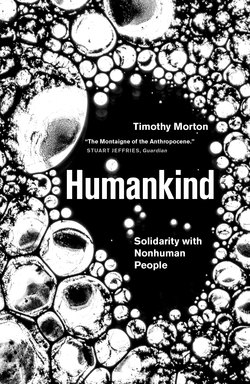Humankind

Реклама. ООО «ЛитРес», ИНН: 7719571260.
Оглавление
Timothy Morton. Humankind
HUMANKIND. Solidarity with Nonhuman People
Timothy Morton
Contents
Acknowledgments
Things in Common: An Introduction
1. Life
2. Specters
3. Subscendence
4. Species
5. Kindness
Notes
Index
Отрывок из книги
For the Water Protectors
Things in Common: An Introduction
.....
What is the default characteristic of this thought mode? Let’s call it “explosive holism”: a belief, never formally proven but retweeted all the time, that the whole is always greater than the sum of its parts. The alternatives are limited. You are a traditional theist or into cybernetics (or any other deployments of this concept); or you are the kind who shows their behind to the political father, as Roland Barthes put it.29 You are either in church or you are thumbing your nose at church. In either case, there is a church. It’s one big reason why talk about populations, which is ecological talk, is considered highly suspicious on the academic left. The population concept definitely has no time for its parts, otherwise known as people such as you and me. This is the utilitarian version of explosive holism, and its near monopoly on talk of species is rightly concerning. But if we can’t talk about something like it at all, for fear of sounding like eugenicists or social Darwinists, a left ecology is a fruitless dream. How to proceed?
One very obvious instance of explosive holism is the concept of the invisible hand, developed in Adam Smith’s theory of capitalism and first promulgated by Bernard de Mandeville in The Fable of the Bees, the subtitle of which is Private Vices, Public Benefits. That difference between private and public is a metaphysical difference between parts and wholes that is also a difference between lesser and greater. The invisible hand has evident theistic overtones, conjuring up images of divine providence. Capitalist ideology has relied strongly on explosive holism. The invisible hand concept is emergent and teleological. A benevolent group telos is said to emerge from the selfish actions of individuals. From this teleology springs social Darwinism, which differs from actual Darwinism on this key point, the strong sense of “survival of the fittest,” a phrase of Herbert Spencer’s inserted into The Origin of Species out of fear for the implications otherwise. Selfish, greedy aggression is good in the long run.
.....